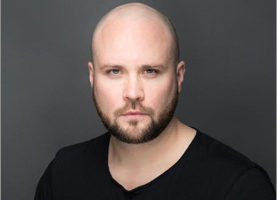Paul Ehrlich co-wrote and published a book called “The Population Bomb” in 1968. A commentary (and warning) to the dangers of overpopulation, Ehrlich predicted that continued population growth would lead to famine, economic collapse, and significant climate change. The global population has doubled since the book’s initial release 50 years ago. In today’s episode, we revisit Ehrlich’s initial predictions to see how many have come true, and to what extent. Ehrlich discusses the paradoxes of population growth, how the political climate is compounding the effects of population growth, and how we got to this point. Tune in to find out if, and how, we can change the current course of population-related issues.
For more information, Ehrlich encourages listeners to do their own research by seeking reputable sources, and then taking action by becoming politically involved.
Richard Jacobs: Hello. This is Richard Jacobs with the future tech and future tech health podcast and I have a returning guest, Paul R Ehrlich, famous guy who’s been around for a long time. He wrote a book called the population bomb. Oh, I believe in 68. Is that right Paul?
Paul Ehrlich: That’s right. I was only two years old. You gotta, I mean that’s an important thing to point out.
Richard Jacobs: I was negative seven and then the big accomplishment. Um, yeah, last time. I know, I guess we talked about um, yeah, epidemic recess jaws and small announcements. This is totally different topic. So, you know, I, and that was, this book was written a long time ago, but I’m sure this is something you thought about in your whole life. Yeah. The population explosion. And you’ve now witnessed what’s happened over the past, you know, 40 some odd years. So that’s what I wanted to ask you. What prompted you back in 68 to write the book and then I’d like to go through what’s happened since and what your thoughts are.
Paul Ehrlich: Well, first of all, uh, the thing that stimulated me to write the book back then, was even then it was crystal clear that are environmental problems, which were becoming a much more talked about because of silent spring. Um, that’s the one element that was not being discussed at all. And the main, uh, one of the main causative elements in it was human overpopulation. And, uh, I can’t say that I think it’s changed very much. I have been working very hard the last few days with a group of scientists who were trying to get an article out, pointing out once again that people are utterly ignoring the role of the population size and growth has, uh, in cooking our future. So, uh, nothing much has changed. It’s only been 50 years, but what the hell?
Richard Jacobs: Eh, were, what were some of your predictions back in 68? And then now that you look back upon them, you know, how do you…
Paul Ehrlich: Well we predicted that the climate would change in part in response to the client, too, uh, the growth of the human population. Uh, and of course it has changed and is changing rapidly and now threatening our very existence. Uh, we predicted that one of the lines in the book that was most attacked was, um, near the front. I think it was actually on the front page, which says the battle to feed all the humanity is over. And everybody said that’s nonsense. We’re going to all become vegetarians. We’re going to, um, eat the whales that are farmed and add tolls and so on and so forth and it turns out that today there’s something on the order of 800 million people starving and another 2 billion with diets. But that has not affected the people. They say keep saying the same stuff. You know, the population doesn’t make any difference. Uh, and of course the, anybody with an IQ of over 30, uh, you can see immediately it makes a huge difference. Uh, how we affect our resources with each other. Our planet is a function both of how many of us there are and how each of us behaves. Uh, and uh, you put them together. For example, if people, if each individual is beginning on average to consume more and you have more and more people, then guess what, since aggregate consumption is the main impact we have on our environment, our impact keeps increasing. And that you don’t have to be very bright to realize you cannot grow forever. Uh, on a finite planet just can’t be done. Of course, excuse me, Jeff Bezos understands it well. Just go off and live on satellites, which I think is a great plan.
Richard Jacobs: Okay. The narrative seems to be, you know, the population has grown tremendously, but now the growth is slowing. Is that what you see and you think we’ll get to a, a, you know, a status where we’ve stopped growing. You know, we’re in the, where we get the, let’s say 10 billion or 11 billion?
Paul Ehrlich: Without a question, we’ll get to status when we’re not growing. No, no. Scientists would dispute that. Ah, the question is what the size will be when we stopped growing? Is it going to be, say we have pushing seven and a half million a billion people today? Um, when, and I wrote the population bomb in 68, there were about three and a half million. So we’re more than twice as many people today. The sustainable number, in the long run, is probably somewhere around a billion, the long run being a few centuries. Uh, and so, uh, the issue is can we get back down from seven and a half billion, uh, to, uh, somewhere in the vicinity of one to 3 billion, uh, over the next few centuries and, uh, the answer is almost certainly we’ll get there. The issue is, do we get there by dramatically reducing our birth rate, uh, or do we get there by dramatic? Earth dramatically increasing our death rate. And that’s not clear at the moment, although all the odds seem to be in favor of increasing the death rate. There was no choice. You’ve gotta be one or the other.
Richard Jacobs: Okay. And how did you come to that calculation between one and 3 billion and what goes into figuring that out?
Paul Ehrlich: Well, we, what we did, I did it with several colleagues and it was, uh, um, probably 25 years ago now. Uh, but we asked the following question. Um, if you want to have an optimum population on the planet, how many can you support, uh, where you would have big cities, where people who like to have, uh, opera and good restaurants and also wilderness where you have people good life with nature and the hermit. And assuming something like the then-available technologies, how many likely could you support in those conditions? And it came out to be about a little over a billion, uh, over a billion people. And just to be safe, uh, you might support two or 3 billion, but to be safe, keep it below, uh, the, uh, the grand total. And that was about the number of people we had at the turn of the 20th century, you know, around 1900 when there were big cities and industry and also a lot of wilderness.
Richard Jacobs: What about technologies that have a common valley Haber bosch process?
Paul Ehrlich: Well, yeah, some of the technologies have, uh, at least temporarily expanded. For example, our food supply, although, um, the, for example, the extra nitrogen in the, uh, environment from the Haber bosch process is not a very good thing. Um, we have dramatically changed as we discussed last time a, the kind of food we produce in that has had, um, a whole series of negative aspects of humanity. We are, uh, among other things getting fat or getting more diabetes, um, getting more heart disease, uh, and so on. Um, and that has its effects on us. But the main thing right now, they’re two, two or three things that our technologies are doing to us, uh, which are very, very dangerous. First of all, of course, there’s the adding of greenhouse gases to the atmosphere and we buy it. The more people you have, the more greenhouse gases go into the atmosphere. As a matter of fact, um, the, uh, the food system itself contributes something on the order of a third of the greenhouse gases that go into the atmosphere. So the more people you have, the more food you need to produce. The more greenhouse goes with gazes, go into the atmosphere, the more the climate is disrupted. And of course, food production is directly and intimately connected, uh, to the climate. So the very process of getting ourselves more food, uh, is also a process of disrupting the climate and, uh, hindering, uh, the amount of decent food we can get. I mean, for example, just adding carbon dioxide to the atmosphere reduces the nutritional value of our main grain crops. So we were very busily sawing off the limb we’re sitting on, uh, and uh, people have not yet learned a very, very basic fact of arithmetic. That is a long history of exponential growth in no way implies a long future of that kind of growth,
Richard Jacobs: I guess all exponentially growing systems reach a point where the entire system changes dramatically.
Paul Ehrlich: Exactly.
Richard Jacobs: So, What level of awareness you believe there is? What’s going on? You know, amongst various groups. Well, and just politicians, the average person.
Paul Ehrlich: The awareness in the scientific community is very high. Uh, there had been a whole series of warnings published by the scientific community and paid no attention to by the mass media. For example, I think it was in 1993 all of in scientific academies of the world got together and said, if you keep the population growing, we’re screwed. Uh, and nobody paid the slightest attention and the New York Times didn’t even notice it. Neither did the Washington Post. Uh, and most that, uh, major journals around the world, the mainstream media just ignored it. Um, it was seconded about a year ago. Uh, the first time was several hundred scientists. Um, the second time it was 15,000 scientists and growing today. Uh, but nobody’s paying any attention. Uh, they think the big problem in the world is Trump. Of course, having the country and the world run by a bunch of thugs, uh, is not an ideal way to solve these gigantic problems. But that’s what we’re trying to do. And, uh, ignorance thugs on top of it. So, uh, we’re turning the world over to the losers. They’re running the world and they’re running it into the ground for the profit of themselves and their families and their supporters. It’s not, there is no complexity in it. It’s, you were talking about corruption last time. Well, boy, do we see it now? Um, that’s not a political view. It’s the scientific view.
Richard Jacobs: Yeah, no problem. What do you think of the efforts being made to, uh, curb level warming? Um, no, the parents and chords, uh, you know, caps on emissions.
Paul Ehrlich: Well, there was a point on a lot of issues that have interested me for my entire life when I thought we were making real progress. I mean, uh, for example, in Richard Nixon’s Day, Richard Nixon, um, had his flaws, but he was a very clever politician. Um, and he realized the world was getting into trouble and some of the best environmental legislation started out, uh, pushed by Republicans, uh, in the Nixon days. Then along came, Ronald Reagan reversed the whole thing. He probably, you think Trump was the worst president we’ve ever had. But in terms of ending our civilization, Reagan may have had a larger impact, uh, by reversing our, uh, environmental things. And of course, um, we have now the Republican war on women when we have a desperate situation where we should be doing everything we can to lower birth rates and we’re, everybody knows that the very best, most humane thing you can do to start out lowering birth rates is to give full rights to women. And what are we doing? We have a bunch of thugs trying to take away the rights of women. So, uh, you know, how can one be cheery in those circumstances?
Richard Jacobs: Well, again, the current efforts to, uh, to stem climate change in particular, you’d think that they’re a, have any hope of being effective even with, I mean, we’ll with full participation of all countries in the world, or do you think that’s a, you’re just not even close to the goals we need? I had all the climate goals. Never talked about population. They just talked about getting us to a sustainable level. I’ve never really heard any of them talk about, well, the population would have to come down in order to reach stability. It’s in December. I seem like it is what it is, you know?
Paul Ehrlich: Yeah. I mean, that’s what’s so depressing is that, uh, none of the things that, first of all, even with the assumption that we can continue to grow and the technologies will allow us to reduce the amount of carbon dioxide and other greenhouse gases flowing into the atmosphere, um, that we could meet our goals and keep the uh, uh, the climate, uh, relatively stable and livable. Well, A. there’s no real scientific support for the idea that 2%, two degrees Celsius rise in temperature is safe. It may or may not be, we don’t know enough about the system, but there’s more and more stuff coming out all the time. A very brilliant a research report from um, uh, Australia, uh, pointing out what all of us have known for a long time. That the IPCC is intrinsically very conservative in my view. For example, statements like, well, uh, we have a one in three chance of keeping the temperature, uh, below, uh, uh, say two degrees Celsius increase. Well, a one in three chance is like if somebody told you there’s a one in three chance you won’t have a bullet in your brain, uh, and the next hour you wouldn’t consider that a very conservative estimate. And all of the information that’s coming out makes it look even under current assumptions, uh, which are not being met. Current assumptions, for instance, Paris accords, um, are not likely to get us there or at least are not certain to get us there. And there are huge numbers of things, feedbacks and so on that aren’t being properly considered. So it’s, it’s, uh, a tough shot even if we started tomorrow to try and do the right things. Uh, I have serious doubts personally and many other scientists have doubts too. Uh, that will avoid a really catastrophic climate situation. And that’s only one bit of it because of course, it’s interacting with the destruction of biodiversity, which are the life support systems that we absolutely need. If we’re going to continue to live on the planet and, uh, the loss of biodiversity, uh, you know, the UN recently came out and said a million animals are at risk. It isn’t a million animals we care about. It’s the ecological systems made up of all those animals and plants and microorganisms that support our lives. They are suffering from climate disruption already. They’re also being wiped out for many other reasons. Uh, and without them, we’re going to, we’re not going to be able to do some of the things we really care to do, like eat, you know, most of the, most of our most nutritious crops are pollinated by insects and the insects are disappearing.
Richard Jacobs: So how come you haven’t done an update to the book? It’s been, you know, 50 years and there’s been no update.
Paul Ehrlich: Well, we’ve written about five other books that update it, but nobody pays any attention. Um, and again, there’s nothing just we say, I say the scientific community is saying it repeatedly or something right now, like 20 warnings from science about the things that are going on that need to be stopped. And nobody’s paying any attention to them. You know, the 1993 statement of all the academies, 1993, I think it was also world scientists warning to humanity. The updates of those in recent years have gotten no mass media attention at all. I have yet to hear. The only thing that’s come up in the current political situation, uh, is climate disruption because we’re beginning to see the effects there so dramatically, uh, that Trump can lie his head off, but it’s not going to, you know, people are going to be able to duct the tornadoes on their own. Um, and in places, in many places, they’re going to doing without water. Uh, and whatever Trump says, it’s not gonna make climate change a hoax. You know? Uh, so we, we actually have one candidate, I believe among the Democrats who are making climate disruption. His major is, uh, Jay Inslee. I think his name is. Um, and he’s making climate change his major thing. Well, why should somebody make his major thing the thing most likely to end our civilization in the next 20 years? I mean, why should we deal with that when we have important things? Like how many lies Trump told in the last 15 minutes?
Richard Jacobs: What’s the, so what do you think is the window on which you’re going to see dramatic changes and what are the changes be?
Paul Ehrlich: We’re seeing it right now. Um, we’re seeing it in the, uh, weird weather, the continual tornadoes and so on in the Midwest. Uh, the lengthening droughts and heatwaves. Um, you know, we’re into it already. And of course, you and I aren’t. Most of our listeners are. But if you are living in the city that used to be called Madrid, uh, excuse me, um, Madras in India, uh, you find that the, your water has to be delivered and locked up. Uh, if you can afford it because the drought is so bad, um, and people are starting to go hungry in various parts of the world and that’s going to spread. One of the things we predicted years and years and years ago wrote an entire book on it, is the refugee crisis that’s going to become worse and worse. What are we having now in the United States? A long stupid debate on immigration policy without any debate at all on population policy. The people on both sides of the immigration story are totally ignorant of the causes, consequences, and likely future of this. We’re seeing the bear edge of a start of what’s going to happen as the population expands, particularly in Africa. Uh, and as the population expands and people began to move to get reasonable conditions and their words, we’re seeing now people flooding towards the United States and flooding towards Europe because parts of the world are already into the collapse mode and it’s going to get much, much, much, much worse.
Richard Jacobs: So will it be, yeah. If you were able to make policy and enforce it, will it be some of the prescriptions that you’d, uh, you’d write for now?
Paul Ehrlich: Well, the prescriptions I would write for now deal with the major elements. First of all, uh, we do know that we can change our consumption patterns very rapidly. We know that from history, a, for instance, of the Second World War, when on December 7th, 1942, the United States had produced something like 4 million automobiles. Then the Japanese attacked Pearl Harbor and we didn’t produce any more automobiles for about four years. We’ve produced, you know, hundreds of thousands of tanks, have tracks, jeeps and so on. We rationed gasoline, we rationed meat. I can remember picking milkweed pods in the east in the summer because you could give the, uh, the fluff inside. There were places that collected it for making life jackets for the navy. And so on. Chad, consumption patterns can be changed very, very rapidly as they were in all the nations that went to war in the Second World War. Uh, we can change only change reproductive patterns humanely, slowly, uh, and that means doing things exactly the opposite of what many of the Republican legislators and governors in the United States are doing now. That is giving more rights, more opportunities, equal pay, equal opportunity to women everywhere. And we know from history that the better you treat women, the fewer extra babies they want to have. So, uh, that’s one of the things that I would work on very, very hard. Uh, while I was dealing with the gross economic inequities that cause people, uh, to rush towards the places where there’s still, uh, some work, some food, uh, some safety, uh, which are getting to be fewer and fewer. Uh, and, uh, so if you don’t deal with the population side, eventually that gets you for sure consumption you can deal with rapidly. Uh, but it takes a political will to do it. Equity Issues, particularly economic equity issues, racial equity, gender equity and so on, all are critical to this. If you’re going to get people to be willing to cooperate, you got to give people, uh, you know, some reasonable way to see themselves improving their lives and surviving. Uh, and you’ve got to tackle those. And those are areas where, you know, 25 years ago I might’ve said we made a lot of progress, women’s rights, gay rights, uh, racial rights, religious equity and so on. But now, uh, the thugs have turned it around. Uh, you know, we have a racist rapist as president and nobody seems to care, you know, there, there are 40 million Americans that are willing to vote for that moronic loser. I mean, how can you possibly, uh, think there’s any hope for the country when these 40 million people, uh, who just don’t give a damn.
Richard Jacobs: Oh, okay. So, I’m not sure at this point.
Paul Ehrlich: I am sorry.
Richard Jacobs: No, that’s all right.
Paul Ehrlich: The article that I’m working on with a bunch of colleagues is scientists have to tell it like it is. There’s no point in kidding around about these things. It drives me nuts to hear Democrats saying, we’ve got the whole more hearings to find out whether or not, uh, Trump is a person who should be removed from the office he’s holding. He’s the first president in my lifetime that I thought was so obviously unfit for the office that all you gotta do is turn on the TV for 10 minutes and you’d get three excuses to impeach the man. And yet the Democrats still wanna go slow. Uh, if there ever was a person who deserves to be thrown out of the president’s office, somebody who’s making money, uh, by being president, not, hasn’t followed the constitution at all, and so on. It is just beyond belief. And I don’t see any reason to have hope that we’re going to start moving in the right direction on anything. I’m right now terrified that there’s going to be some kind of a slip in the Middle East and we’re going to have yet another war, one that can turn nuclear and our own policies on the nuclear front make the dangers of an accidental nuclear war even larger than they were during the Cold War. And that’s not my opinion. That’s the opinion that people like Bill Perry, who was Clinton’s last defense secretary and so on. John Holdren, who was the, uh, uh, Obama’s science advisor and so on. Everybody who understands the nuclear situation is scared witless and we, we have two moons, one in North Korea and one in the White House, uh, playing nuclear games. I mean, it’s enough to make you just want to bury your head in the sand.
Richard Jacobs: So what would it be? Um, alright, so will it be some resources for listeners to find out more about, yeah, the realities of the current state of things in addition to podcasts like these, any books?
Paul Ehrlich: I particularly, don’t believe me. I could be a paid agent for the condom industry after all. Uh, there’s lots and lots of material out there. Uh, I can send you some stuff if you want. Um, uh, and if you say, you can distribute it just, I’ll just email you some papers. Uh, and people, uh, you didn’t actually, you can find it almost anywhere, but of course, now you can also find pure crap almost anywhere. And how do you tell them apart? Well, it means a lot of studying. It means a lot of getting your friends and dividing up the world. So some of them know some things very well and others know other things very well, and they can help you short the nonsense, uh, from what you really need to know, the plan, whatever you can, uh, in, uh, uh, you know, saving yourself and the people you love. It’s one of the things I like about the jaws epidemic is it’s one where you actually can do something yourself, uh, to maybe make things better. Uh, very difficult on climate disruption, very difficult on the toxics, which we’re all now getting loaded with more and more, you know, the microplastics that are now going into our brains. Uh, the, uh, climate disruption, all these things are very difficult for individuals to deal with except politically. And if you want to deal with them politically, you gotta vote the morons out of office. You got to get people who actually have policies who understand situations, who are interested in actually studying things and then doing the best possible. Not, you know, nobody knows what the very best is, but we sure as hell know a lot of things that are better than we’re doing now.
Richard Jacobs: Okay. Well, very good. Well, Paul, I, uh, I appreciate you coming and, uh, you know, being a, you know..
Paul Ehrlich: Sorry to depress you.
Richard Jacobs: It’s not depressing. I was going to make a joke and say, you know, you’re a very carefully worded and politically correct statements and no honest things.
Paul Ehrlich: It’s been my pleasure. Thank you very much. And if you send me an email, I will email you some stuff.
Richard Jacobs: We’ll do.
Paul Ehrlich: Thank you.
Podcast: Play in new window | Download | Embed











